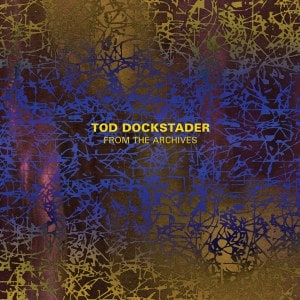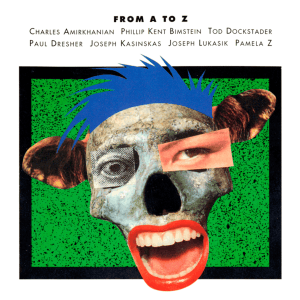This unexpected CD premieres 15 electronic music works from Tod Dockstader, “one of the giants in the field” (The Washington Post).
Carefully selected from over 4,200 sound files left behind by Dockstader, who died in 2015, these were the last pieces composed by Dockstader, before dementia stopped his studio work.
When thousands of files were discovered on Dockstader’s computer, his daughter Tina Dockstader Kinard encouraged a devoted enthusiast, Justin H Brierley, to shift through this extensive material. He painstakingly located hundreds of selections potentially suitable for public release, sorted through these, and eventually sent over 50 promising sound files to Starkland’s Thomas Steenland. Having worked with Dockstader and promoted his music for over 35 years, Steenland carefully reduced these to the final 15 tracks heard on the CD.
In her Introduction, Geeta Dayal discusses the music:
Dockstader stayed relentlessly modern and innovative, pushing into new sonic territories well into his 70s. “From the Archives” sounds radical and new, as fresh as if it was made today. And through it all, this music – like all of Dockstader’s music – is endlessly listenable and inviting, showing a flair for melody, texture, and rhythm even in its most challenging passages… Here, we see Dockstader’s tremendous sonic and emotional range on full display. The cascade of bright music-box chimes of Anat Loop is punchy and upbeat; the clatter of Creek Bells is eerie and sepulchral, like imagined music for a black-and-white horror movie. Mystery Creak is busy and active, a collision of contrasting textures; Choral Mix is placid and slow-moving, a meditative expanse of sound.
The CD concludes with a striking coda, Big Jig. Unlike anything previously heard from Dockstader, this pulsing sonic assault could almost have emerged from the studio of Japan’s noise composer Merzbow.
In addition to Dayal’s Introduction, the CD’s booklet contains comments from Tina Kinard, Justin H Brierley, and Executive Producer Thomas Steenland. The album was mastered by Grammy-winner Silas Brown.
The CD completes a long arc starting from Starkland’s initial release of the first two Dockstader CDs. The subsequent rave reviews for those albums spurred Dockstader to rededicate himself to composing, eventually resulting in the vast archives that spawned this new Starkland CD.
previous Dockstader recordings from Starkland
Starkland’s first Dockstader CD, “Tod Dockstader: Quatermass” (1992), presented Water Music (1963); the darkly ominous, 45-minute work many regard as Dockstader’s masterpiece, Quatermass (1964); and the previously unreleased Two Moons from Quatermass (1964).
A second CD, “Tod Dockstader: Apocalypse” (1993), offered Traveling Music (1960); Luna Park (1961), titled for the burnt-out remnants of Coney Island’s Luna Park and memorable for its eerie laughter; the brooding Apocalypse (1961), with its ominously slowed down creaking door and Hitler broadcasts turned into gibberish; Two Fragments from Apocalypse (1961); Drone (1962); and the previously unreleased Four Telemetry Tapes (1965).
Reviewing these CDs, The Wire wrote, “The obsessive care with which Starkland have compiled these extraordinary recordings should ensure that Dockstader will be remembered as the innovative, visionary figure he undoubtedly was.” Giving both CDs a “strong recommendation,” The Washington Post called Dockstader a “highly imaginative pioneer.” And Stereophile declared, “Tod Dockstader belongs in the select company of Varèse, Stockhausen, Luening, Schaeffer, Subotnick, and the other pioneers of electronic music or musique concrète. His achievement is on a par with the best in his field.”
About Tod Dockstader
Tod Dockstader (1932-2015) took a circuitous, idiosyncratic path to emerge as a leading electroacoustic composer. After studying painting and film at the University of Minnesota, he moved to Los Angeles, became a film editor and writer at UPA studios, and learned to create sound effects and cut sound for cartoons.
Tod next worked as a recording engineer at New York’s Gotham Recording, where he surreptitiously used off-work hours to collect and experiment with diverse sounds. In this fruitful period from 1958 to 1966, Tod’s hard work produced many of his classic pieces, including Traveling Music, Luna Park, Apocalypse, Water Music, Quatermass, and Four Telemetry Tapes. In the mid 1960s, Owl Records released four Dockstader LPs, and Tod received acclaim in such national publications as Saturday Review, Audio, and High Fidelity.
Yet after this creative burst, Tod, though he continued composing, did not issue any new works for over 30 years (with the exception of two LPs of library production music issued by Boosey & Hawkes in 1979/81), for various reasons. After Gotham, he was “bone-tired” and frustrated with the music industry; he also might have been discouraged by a rejection letter from Vladimir Ussachevsky at the Columbia-Princeton Electronic Music Center in 1961. Most importantly, he wanted a steady income to support his wife and new daughter, Tina.
In the early 1990s, Starkland’s release of two Dockstader CDs elicited over 30 outstanding reviews. Dockstader was “stunned” by this new, widespread acclaim, rededicated himself to composing, accumulated about 600 potential works, and re-emerged with the 59 tracks of the massive Aerial, released on three CDs by Sub Rosa in 2005-6. He also partnered with David Lee Myers on two CDs of original material.
Tod continued composing until stopped by dementia. He died February 27, 2015, listening to his music.










